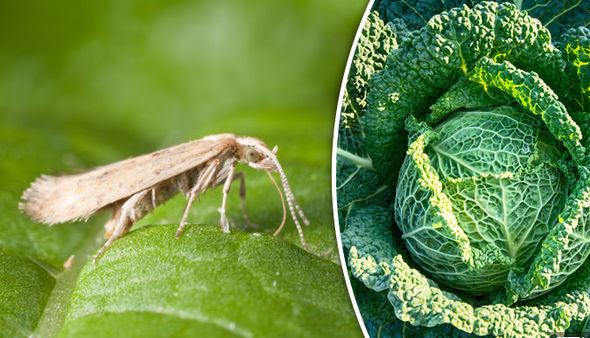AN INVASION of super-moths which attack crops including cabbages and cauliflowers are expected to arrive in Britain from eastern Europe.
Experts have warned of a potential explosion in numbers of the insect after exceptionally high numbers of moths arrived in the UK.
The diamondback moth (Plutella xylostella), which can be blown long distances on the wind, is considered to be a super-pest because it is resistant to most insecticides, and the centimetre-long caterpillars can cause losses to growers.
Researchers say that if the weather is warm and suitable for breeding there could be an “explosion” in numbers by the end of the season.
They say they do not know exactly where the moths have come from, but it could be eastern Europe or Russia.
Chris Shortall, a research scientist and co-ordinator of the Rothamsted light-trap network in Hertfordshire said he had seen higher than usual numbers of the moth in traps at the research centre, and online reports of a high incidence of diamondbacks.
He said: “Normally, we gather the data at the end of the year from the volunteers that run light-traps around the country, but on the basis of these reports I contacted them and asked them to provide the data that they have so far.
“They reported much higher numbers than usual. In our light-traps here at Rothamsted we have seen in two nights the number of diamondback moths that we usually record in a year, and this is reflected elsewhere in the network.
“I’m concerned for cabbage and cauliflower growers, which is why I wanted to inform the relevant organisations and growers as early as possible.
“If the summer weather is warm and favourable for the reproduction of the moths we could see an explosion in the number of them by the end of the season.”
According to long-standing annual records from the Rothamsted Insect Survey, numbers reported so far are exceptionally high, and of a similar level to that seen in 1996.
Sites in eastern England and the Channel Islands have reported around 10 times the normal yearly total over a period of a few nights, with more than 1,000 reported over three evenings from a trap in Berkshire, and 310 in one night in Guernsey.
Diamondback moths have also been found in large numbers in trap samples from cabbage fields in Kirton, Lincolnshire, and Wellesbourne, Warwickshire, the experts said.
The scientists will examine the moths to see if they are resistant to pesticides, and find a way to tackle them.
Dr Steve Foster, senior scientist at Rothamsted Research, said: “We will aim to study the moths that are immigrating currently to the UK to identify whether they are resistant to the available insecticides and look for potential management methods.
“This could take up to a few weeks.”
He urged growers to speak to their authorised advisers on spraying their crops and said the experts would provide all scientific information when it became available.
Mark Parsons, head of moth conservation at Butterfly Conservation, said the recent migration of diamondback moths, are likely due to following winds from their breeding grounds, was unusual for its large numbers but not completely unexpected in the UK.
He said: “This is an occasional minor pest in this country on brassicas and it is possible given the numbers this year it may prove to be a bit of a nuisance, but we won’t know for a few weeks until any caterpillars have hatched.â€
Source: Science Daily
Writer: KATIE MANSFIELD







